Smoking e-cigarettes has greatly spiked in popularity in the past few years and it is negatively impacting the youth in United States of America. One of the most popular companies taking advantage of this is JUUL. JUUL has deceived smokers into believing that e-cigarettes are a safe alternative to quitting and also has deceived non-smokers, especially teenagers into believing that e-cigarettes are safe to use. The same time that users of this product are believing this information, they are also not being properly warned about the true dangers of nicotine addiction and related diseases. They must be held accountable.
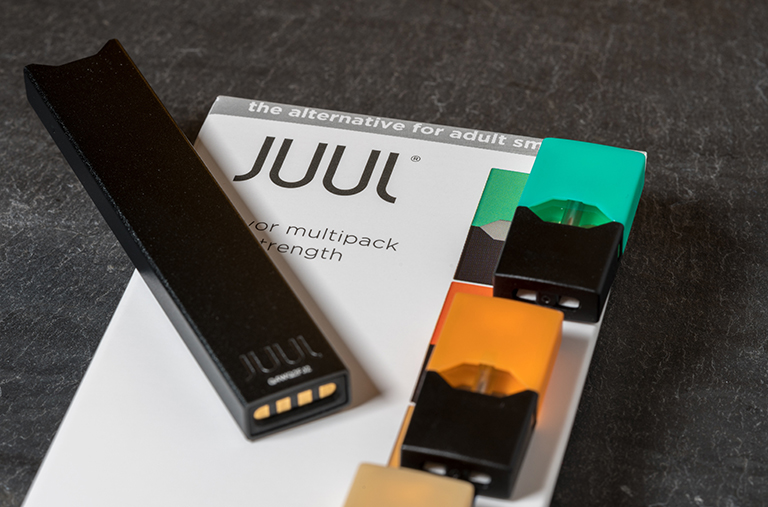
Are you or someone you love suffering from lung disease related to vaping or addicted to nicotine after using Juul or other e-cigarette products? The Jackson, Mississippi-based firm Chhabra & Gibbs is filing cases on behalf of individuals who developed the deadly lung disease linked to vaping known as EVALI, or “e-cigarette, or vaping, product use associated lung injury”, as well as on behalf of individuals who developed nicotine addiction from vaping.
MISSISSIPPI VAPING LUNG DISEASE (EVALI) LAWSUIT
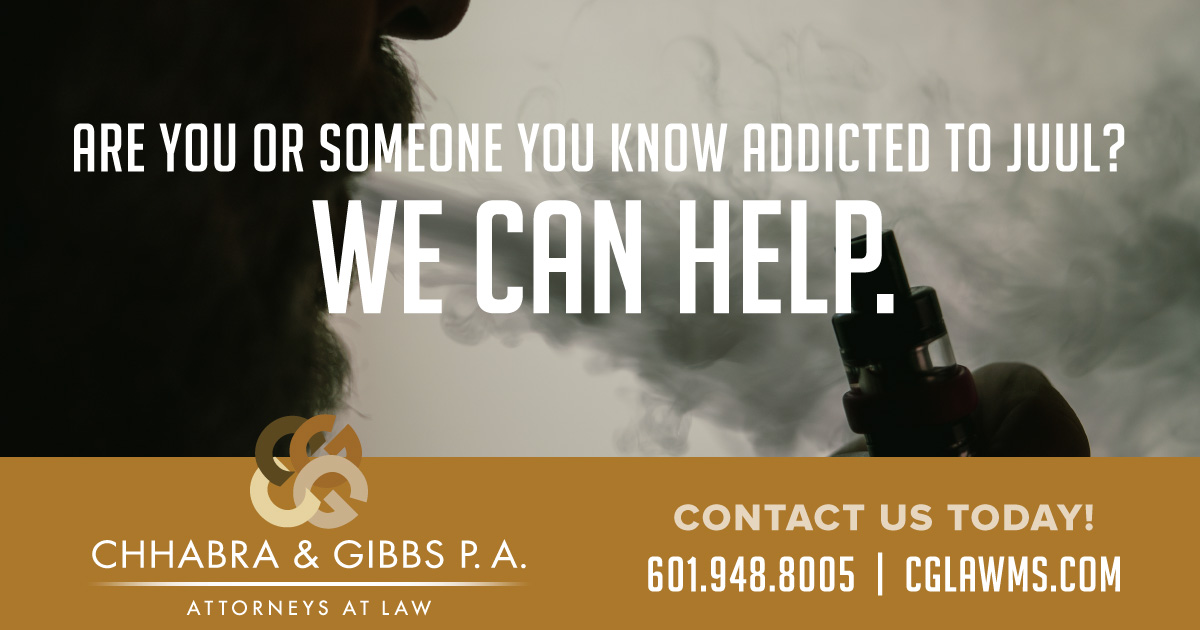
Earlier this year, a handful of cases of a previously unknown lung disease seemingly linked to vaping were reported in the U.S. Just months later, the vaping lung disease EVALI is a national public health crisis that has spread to 49 states (all except Alaska), Washington, D.C. and the U.S. Virgin Islands. On Nov. 5, the U.S. Centers for Disease Control & Prevention (CDC) reported 2,051 confirmed or probable EVALI cases and 39 deaths across the country. According to the CDC’s map of the disease, there have been 1-9 cases of EVALI in Mississippi to-date and one confirmed death.

Health officials have reported that a majority of vaping-related lung disease cases and deaths occur in patients with a history of using THC-containing vaping products. On Nov. 8, CDC researchers revealed that vitamin E acetate, an oil used as an additive in many THC-based vapes, has been identified as a potential culprit behind the EVALI outbreak. Vitamin E acetate is safely used in everyday products like vitamin supplements and body lotions, but inhaling the oil is coating and sticking to people’s lungs and leading to serious respiratory symptoms.
EVALI has symptoms similar to other severe respiratory illnesses, like the flu and pneumonia, and can develop over a period of several weeks or in a matter of days. Mississippi area vaping lung disease patients have reported the following symptoms:
- Abdominal pain
- Coughing
- Chest Pain
- Diarrhea
- Difficulty breathing and/or shortness of breath
- Fever
- Fatigue
- Nausea and/or vomiting
Health officials say that vitamin E acetate is probably not the only cause of the EVALI outbreak. Some EVALI patients reported using nicotine vaping products that do not contain the substance. Those who continue to vape should monitor themselves for EVALI symptoms and seek medical attention right away if any health concerns emerge.
VAPING NICOTINE WITHDRAWAL SYMPTOMS
By nature, quitting an addictive substance like nicotine is hard – but it’s also worth it. To safely quit nicotine, though, it’s important to know what the normal signs of withdrawal are. Individuals going through withdrawal from vaping have reported experiencing:
- Abdominal cramping
- Constipation and gas
- Coughing
- Headaches
- Intense nicotine cravings
- Nausea
- Sore throat
- Sweating
- Tingling in the hands or feet
If you have any concerns about how long your withdrawal symptoms are lasting, seek medical attention right away to make sure nothing more serious is going on.
THE MISSISSIPPI TEEN VAPING ADDICTION EPIDEMIC
The nicotine-containing e-cigarette maker Juul Labs, Inc., controls over 71% of the market share of the vaping industry in the U.S. Juul’s e-cigarettes were originally released in 2015, and their popularity soared after Juul engaged in targeted marketing campaigns directed at children, teenagers and young adults. Now, Juul is linked to the staggering number of young people addicted to nicotine in Jackson, in Mississippi and across the nation.
Vaping, which is also called “juuling”, is part of the daily life of Mississippi teens. As part of compliance checks to limit underage sales, the Alcohol and Tobacco Enforcement Division in the Mississippi Attorney General’s Office discovered over 75 vape stores and lounges – which don’t need to be permitted under the state’s law. This makes vaping even more accessible to young people, according to Attorney General Jim Hood, who added that “every parent, teacher, coach, preacher and doctor should be alarmed at what’s taking place among our youth and the ease of access to these largely unregulated products”.
Vaping is popular in Mississippi’s college students, too. An infographic released by the Attorney General’s office states that over half of University of Mississippi students and more than one-third of Mississippi State University students have tried a Juul e-cigarette at least once.
Juul targeted Mississippi’s teens and college students via social media campaigns that used eye-catching vibrant colors, young models, and advertised tempting flavors like Mango, Mint, Creme Brulee and Fruit Medley. As a result, Juul is the target of an increasing number of consumer lawsuits filed by individuals who claim its deceitful product packaging and marketing tactics caused teens to develop intense and potentially irreversible nicotine addiction. Meanwhile, it took a full-blown public health crisis for many young people to even begin questioning the safety of e-cigarettes. In reality, one single-use Juul pod contains approximately the same amount of nicotine as an entire pack of cigarettes.
The U.S. Food & Drug Administration (FDA) issued a warning letter to Juul on Sep. 9, 2019 accusing it of illegally “marketing unauthorized modified risk tobacco products by engaging in labeling, advertising, and/or other activities directed to consumers,” including a school presentation given to high school students. According to the letter, a Juul representative made the following statements to students:
- Juul “was much safer than cigarettes” and that “FDA would approve it any day.”
- Juul was “totally safe.”
- A student “…should mention Juul to his [nicotine-addicted] friend…because that’s a safer alternative than smoking cigarettes, and it would be better for the kid to use.”
- “FDA was about to come out and say it [Juul] was 99% safer than cigarettes…and that…would happen very soon….”
Juul has already been impacted by the nationwide criticism, recently confirming plans to reduce hiring and cut its staff by 500 by the end of the year. On top of that, an increasingly unfavorable U.S. regularly environment regarding e-cigarettes caused Philip Morris International to call off merger talks with Altria, Juul’s top investor, which would have created a $200 billion global power. Additionally, Juul’s now-former CEO Kevin Burns resigned in September 2019, apologizing for the epidemic of youth nicotine addiction fueled by Juul: “as a parent of a 16-year-old, I’m sorry for them, and I have empathy for them.”
HOW ADDICTIVE IS VAPING?
Health experts worry that nicotine salts, like those used by Juul to make its e-cigarettes, are sentencing young people to a lifetime of nicotine. Experts warn that these substances could cross the blood-brain barrier and cause learning, memory and attention problems and lead young people to become addicted to other dangerous substances. The most recent generation of e-cigarettes also reportedly has a higher level of nicotine than previous models, making vaping even more addictive. Up to 495,000 teenagers who vaped by 2018 are expected to become cigarette smokers in the future as a direct result of vaping, and this number is likely to grow when young people who began vaping in 2019 are accounted for.
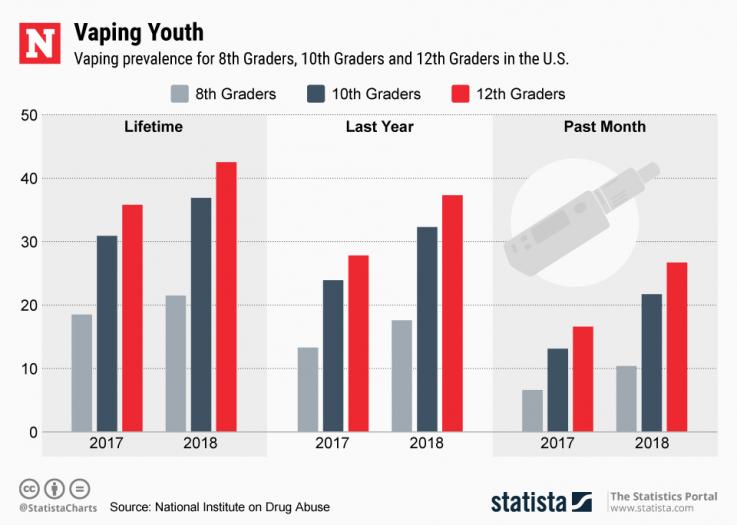
If you are a Mississippi teenager addicted to vaping, the Substance Abuse and Mental Health Services Administration (SAMHSA) can direct you to a facility to assist you with quitting. The Truth Initiative is another resource available for those looking for ways to quit Juul. There is a free, first-of-its-kind text messaging program that has been set up to give teens the support they need to quit Juuling. You can access the program by texting “DITCHJUUL” to 88709. The Mississippi State Department of Health also runs the Mississippi Tobacco Quitline, “a free telephone counseling, information, and tip line that is available for anyone interested in kicking the habit.”
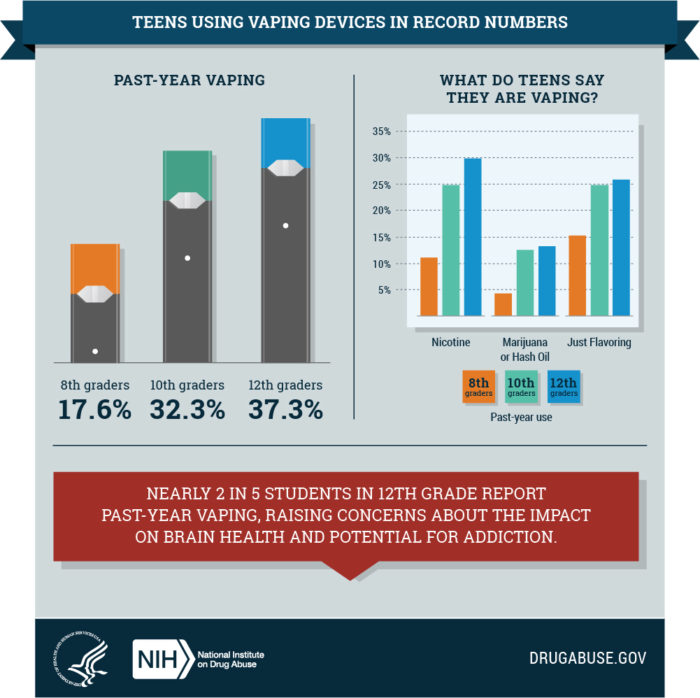
THE E-CIGARETTE INDUSTRY UNDER SCRUTINY
Local, state, national, and international regulators are scrutinizing the e-cigarette industry and have themselves become the subject of scrutiny. U.S. lawmakers recently accused the CDC and FDA of dropping the ball by failing to regulate the vaping industry. Frank Pallone Jr., D-N.J., the chairman of the House Energy and Commerce Committee, attributed the dramatic increase in teen e-cigarette use and subsequent EVALI outbreak to a 2017 FDA decision to delay a review of vaping products.
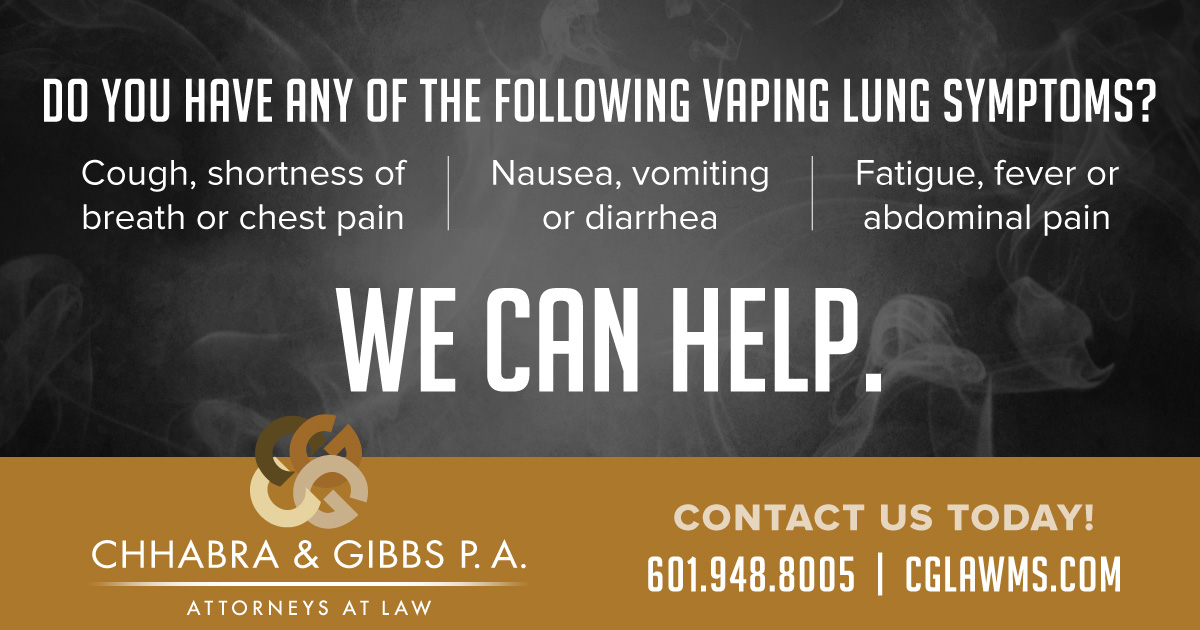
CONTACT AN EXPERIENCED MISSISSIPPI VAPING LAWYER TODAY
The law firm of Chhabra & Gibbs is entirely dedicated to helping individuals and families. We are prepared to stand up to Juul and Big Tobacco and are committed to making a positive difference in the ongoing vaping addiction and lung disease epidemic. If you or a loved one is battling nicotine addiction or lung disease after vaping, call Chhabra & Gibbs’ Jackson, Mississippi office by phone at 601-948-8005 locally or 1-877-317-8005 toll-free. Another option is to fill out our online contact form, and we will get back to you as soon as possible to discuss your legal options.


